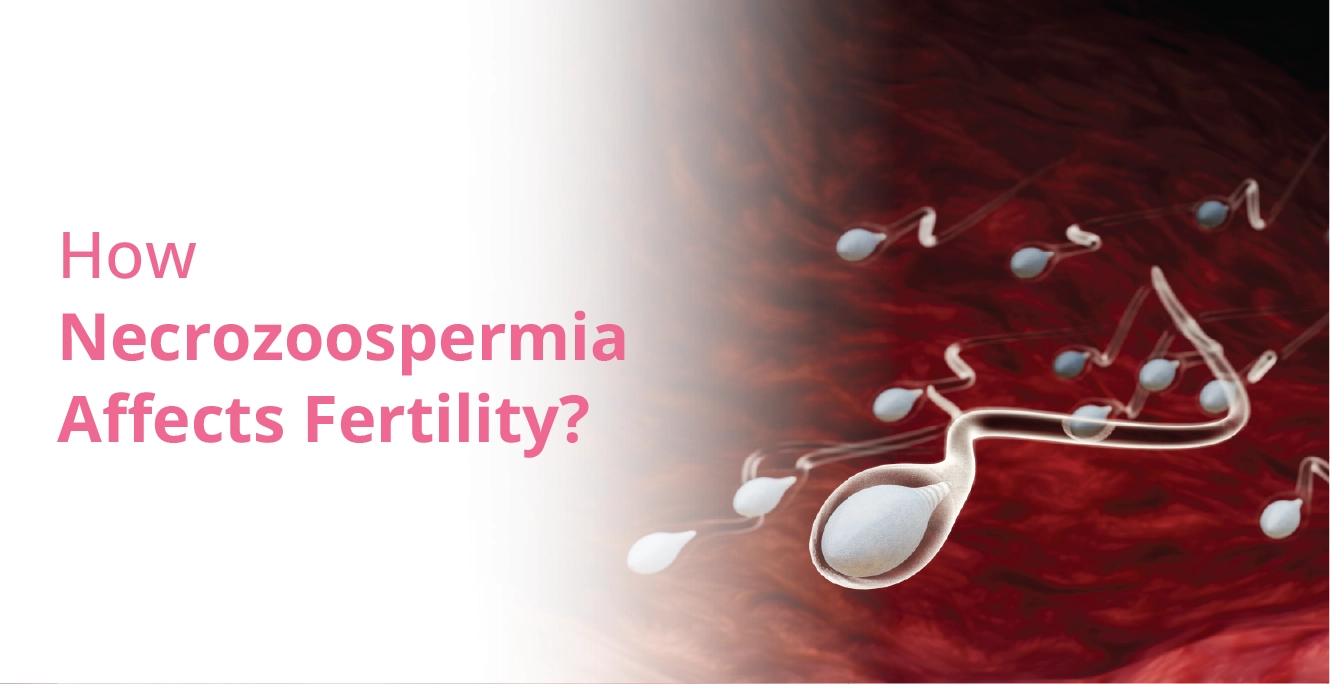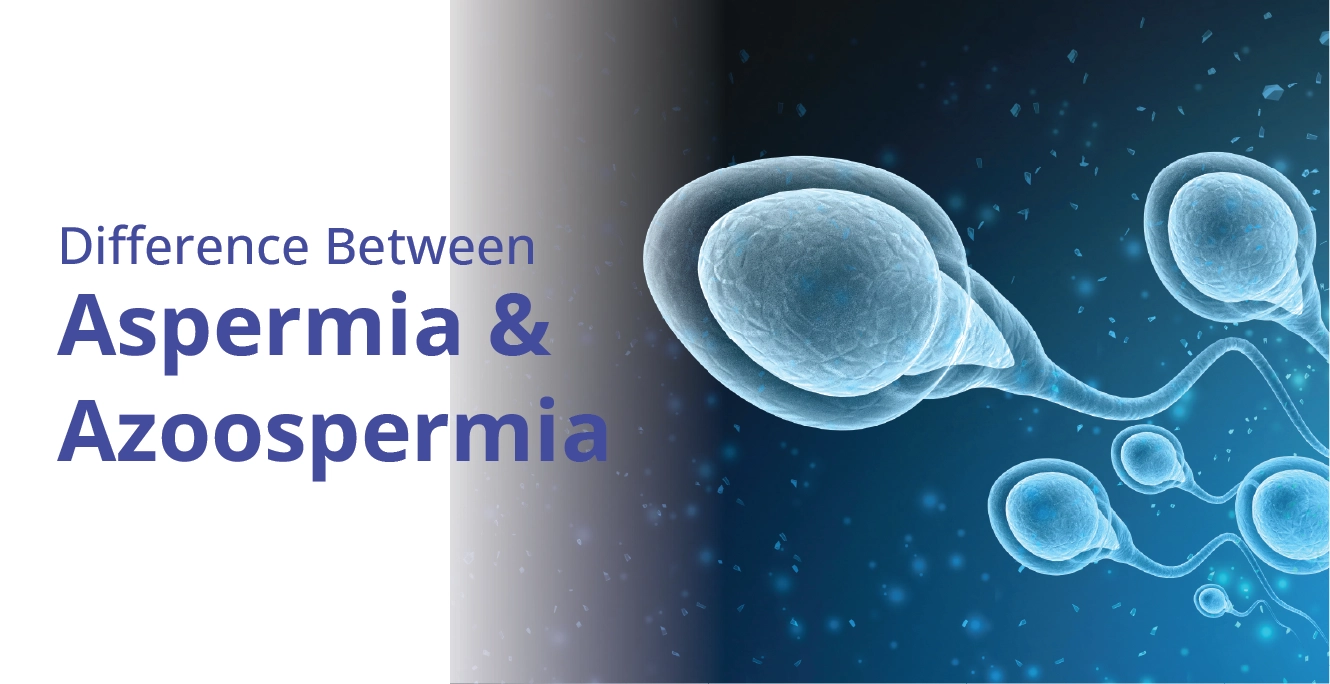
What are the Symptoms of Azoospermia?

Table of Contents
- What is Azoospermia?
- Types of Azoospermia
- What Causes Azoospermia?
- Significant Azoospermia Symptoms and Signs
- Diagnosis of Azoospermia
- How Azoospermia Impacts Male Fertility?
- Treatment Options for Azoospermia
- Prevention Tips for Azoospermia
- Is Azoospermia Curable?
- How Common is Azoospermia?
- Way Forward
- FAQ
- Can lifestyle changes improve sperm count in azoospermia?
- Can all cases of obstructive azoospermia be treated through surgery?
- Can hormonal therapy alone restore sperm production in non-obstructive azoospermia?
- What are the techniques for collecting sperm from individuals having azoospermia?
- Can sperm be restored after azoospermia?
- Can azoospermia be reversed?
- How long does it take to recover from surgical treatment for azoospermia?
Parenthood is the greatest gift of all. But when couples face fertility challenges, the path to parenthood becomes bumpy and emotionally draining. The worst-case scenario is when a man faces azoospermia. In this condition, no sperm is present in the semen, which makes natural pregnancy difficult. If you are still confused about what this means, you are not alone.
With the help of the right diagnosis and specialised treatments ( IVF and ICSI), men with azoospermia can achieve parenthood. If you have zero sperm count and are wondering how to increase it, here is the complete guide. We have covered the underlying causes, symptoms, and treatment options of azoospermia.
What is Azoospermia?
Azoospermia means that there is zero sperm count in the semen. The condition is one of the key reasons behind male infertility that prevents natural conception. However, this doesn’t mean that men suffering from azoospermia have a permanent blockade to becoming a father. There are advanced medical treatments like IVF and ICSI that have helped many successfully become fathers.
Types of Azoospermia
The three types of azoospermia conditions are:
| Type | Description | Causes | Treatments |
| Obstructive Azoospermia | This is caused by blockages that prevent sperm from mixing with semen. | Common causes include previous vasectomy, infections, congenital defects, etc. | Treatment includes surgery to remove blockages or TESA for sperm retrieval. |
| Testicular Azoospermia | This occurs when the testes produce little or no sperm at all. | This may be caused due to varicocele, genetic conditions or radiation exposure. | Treatments may involve TESA or hormonal therapies based on the severity of the condition. |
| Pre-Testicular Azoospermia | This mainly occurs due to hormonal imbalances that have a potential impact on sperm production. | Causes may include pituitary gland dysfunction, low testosterone or medication side effects. | Treatment includes hormone therapies and lifestyle modifications. |
What Causes Azoospermia?
The common causes of azoospermia include:
-
Genetic Abnormalities
There are conditions like Klinefelter syndrome, where men are born with both X chromosomes, which can eventually affect testicular development and sperm production. There can be other genetic mutations that may also lead to similar outcomes.
-
Blockage in the Reproductive Tract
Some previous surgeries, like vasectomy, pelvic surgeries, hernia repairs, or trauma, can block the passage of sperm. There are other conditions, like retrograde ejaculation, where semen enters the bladder instead of exiting through the penis, which can result in azoospermia.
-
Previous Infections
Many men experience infections like chlamydia, gonorrhea, or mumps orchitis, which can damage the testicles or block the passage for the sperm to transfer. Chronic inflammation in the reproductive tract can scar the ducts that carry sperm.
-
Hormonal Deficiencies
The brain releases hormones like FSH (Follicle-Stimulating Hormone) and LH (Luteinizing Hormone) to stimulate sperm production. A deficiency in these hormones, or issues with the pituitary gland or hypothalamus, can lead to reduced or absent sperm production.
-
Testicular Causes
There are some conditions, like undescended testes, radiation exposure, or chemotherapy, that can damage the ability of the testes to produce sperm, which can result in azoospermia.
Significant Azoospermia Symptoms and Signs
There is no set of clear symptoms to know about azoospermia. However, if one engages in unprotected sexual activity regularly and is still not able to conceive, then they should get themselves checked. Other signs that azoospermia specialists discuss are:
- Low or Absent Ejaculate Volume: People who have azoospermia show signs of decreased semen volume during ejaculation or, in certain situations, a complete lack of it.
- Hormonal Abnormalities: In addition to being a contributing factor to non-obstructive azoospermia, hormonal imbalances can cause symptoms including gynecomastia (enlarged breasts), decreased facial or body hair development, or lower-than-expected muscular mass.
- Testicular Abnormalities: Persistent discomfort, pain, or swelling may be linked to structural issues with the testicles, resulting in low volume of semen.
- Past Medical History: If there is a past surgery history of infection or damage to the reproductive system, then one should be diagnosed. Genital pain or discomfort is a non-obstructive symptom of azoospermia.
- Underlying Medical Condition: Azoospermia can be caused by illnesses such as Klinefelter syndrome, a genetic condition in which males have an extra X chromosome. Infertility, smaller testicles, and reduced facial and body hair are possible symptoms.
Diagnosis of Azoospermia
Your doctor may use the following methods to diagnose your condition.
-
Semen analysis
Semen analysis is the first step during the diagnosis of azoospermia. In this, men are asked to provide a semen sample, which is examined extensively in a laboratory to check the sperm quality, quantity, motility, and morphology. It needs to be done a couple of times since sperm levels can vary.
-
Hormone testing
Next comes hormone testing, which involves a blood test to measure hormones such as FSH, LH, and testosterone. Abnormal hormone levels can point to problems in the brain or testes that interfere with sperm production. For example, high FSH may signal poor testicular function, while low testosterone can indicate that there are some issues with the hormonal balance.
-
Imaging tests
Imaging tests such as scrotal ultrasound, transrectal ultrasound, or MRI are often used to detect blockages or structural issues. These scans can reveal obstructions in the vas deferens or ejaculatory ducts, varicoceles, or abnormalities in the testes and surrounding reproductive structures.
-
Genetic screening
At last, there are genetic screenings that help identify hereditary causes of azoospermia. There are tests like chromosomal analysis or Y-chromosome microdeletion testing to help diagnose genetic conditions like Klinefelter syndrome. It is one of the most important steps before going for ART. Genetic screening ensures that there are no hereditary factors that need to be managed properly.
How Azoospermia Impacts Male Fertility?
Azoospermia, as we know, is a condition where no or very little sperm is present in the semen. Without sperm, conception becomes impossible. However, treatments like IVF and ICSI allow direct sperm retrieval for fertilisation. With these advanced medical treatments, even men with no sperm in their ejaculation can have a chance of becoming a biological father. Early diagnosis helps, and proper treatment planning significantly improves the success of such fertility interventions.
Treatment Options for Azoospermia
Most couples facing difficulty on their journey to parenthood ask, “Can azoospermia be treated?” The simple answer is yes. Your doctor may suggest any of the following options for azoospermia treatment.
-
Surgical Interventions
For men suffering from obstructive azoospermia, where the physical blockage prevents sperm from entering the semen, surgery is what doctors recommend the most. There are azoospermia treatments like vasovasostomy, varicocelectomy, or epididymovasostomy that can help remove the blockage. These also help improve testicular function while repairing any damaged ducts. When done in a timely fashion, these surgical interventions can restore the natural flow of sperm into semen.
-
Hormonal Therapy
There are cases of pre-testicular azoospermia in which the body’s hormones fail to stimulate sperm production. In this kind of condition, surgical interventions might not be necessary; instead, medication or hormone replacement is a better sperm blockage treatment. The treatment generally includes gonadotropin injections among other therapies to correct hormonal imbalances, stimulate the testes, and enhance sperm production.
-
TESA (Testicular Sperm Aspiration)
It is an azoospermia treatment in which sperm is directly retrieved from the testes with a fine needle or surgical extraction. These sperm can then be used for advanced fertility treatments like ICSI or IVF.
-
Assisted Reproductive Technology (ART)
If sperm retrieval is possible but natural conception remains difficult, ART treatments provide an effective solution. Techniques like IVF (In-Vitro Fertilisation) and ICSI (Intracytoplasmic Sperm Injection) enable fertilisation using the retrieved sperm, offering couples a strong chance of achieving pregnancy. Many women often share experiences like, “my husband has azoospermia, but I got pregnant with the help of ICSI/IVF,” highlighting how ART can turn hope into reality for couples facing this condition.
-
Lifestyle Changes
A balanced diet and healthier habits can support sperm production and increase sperm count. Avoiding smoking, alcohol, or drugs can also significantly improve reproductive health and may enhance sperm production potential
Prevention Tips for Azoospermia
While we cannot prevent all the causes of azoospermia, we can adopt some healthy habits. For men wondering, “My sperm count is zero, how to increase it?”, lifestyle changes like managing stress, exercising regularly, and maintaining a balanced diet can be beneficial. Here are some practical tips:
Maintain a Healthy Lifestyle
- Balanced Diet: Adopt a healthy lifestyle by including nutrient-rich food in your diet, like fruits, whole grains, vegetables, lean proteins, and food that is high in antioxidants (like nuts and seeds). These support healthy sperm production.
- Regular Exercise: Moderate physical exercise improves blood circulation, balances hormones, and reduces the risk of obesity.
Avoid Harmful Substances
- Refrain from Smoking: Smoking introduces toxins that damage sperm DNA and reduce sperm count.
- Avoid Excessive Alcohol: Drinking excessive alcohol can interfere with testosterone production and impair sperm development.
Protect from Environmental Toxins
- Reduce Exposure to Chemicals: Pesticides, heavy metals, and radiation can affect sperm production. If you work in environments with high exposure, use protective measures.
- Heat Exposure: When men go for long saunas or prefer hot tubs every day, there is a chance that it can raise scrotal temperature. This reduces sperm production. Hence, it is advised to avoid excessive heat and wear loose clothing.
Go for Regular Check-Ups
- Prioritise Routine Health Check-ups: One must have routine fertility screening to help detect early warning signs of azoospermia.
- Treat Infections Efficiently: Untreated STIs or urinary tract infections can cause blockages or damage that contribute to azoospermia.
- Manage Health Conditions When Diagnosed: Conditions like thyroid, diabetes, or obesity can play a huge role in azoospermia. Hence, manage them with medication to lower the risk that contributes to poor reproductive health.
Is Azoospermia Curable?
Yes, some forms of azoospermia are treatable. Surgical correction, hormone therapies and advanced reproductive techniques can restore or bypass sperm blockages.
How Common is Azoospermia?
Azoospermia affects 1% of all men and accounts for 10-15% of male infertility cases.
By recognising the symptoms early and exploring modern treatments, many men with azoospermia can still achieve their family goals.
Way Forward
A diagnosis of azoospermia does not mean the end of your dream to have a child. With advances in fertility treatments and personalised care, many men successfully become biological fathers. Taking the first step toward understanding your condition opens the door to effective solutions and new possibilities.
If you are facing azoospermia, know that there is hope, support and a way forward. Consulting a fertility expert can help you explore the best treatment options, and you can embrace your dream of parenthood. Feel free to reach out to our fertility experts at Birla Fertility & IVF, where you will get the right solutions to all your concerns. Stay strong because you are not alone!
FAQ
Can lifestyle changes improve sperm count in azoospermia?
While changing one’s lifestyle can generally improve one’s reproductive health, azoospermia often necessitates specialised medical attention. To ascertain the best course of treatment, a consultation with a fertility specialist is essential.
Can all cases of obstructive azoospermia be treated through surgery?
Surgery proves useful for many cases of obstructive azoospermia; however, not all blockages are reversible. The exact cause and location of the obstruction dictate the outcome of the surgery. A comprehensive evaluation by a urologist or fertility specialist is essential.
Can hormonal therapy alone restore sperm production in non-obstructive azoospermia?
The treatment of non-obstructive azoospermia with hormones works when the therapy helps solve hormonal problems. Every person reacts differently to their treatment protocol, and healthcare providers should also explore the possibility of using assisted reproductive technologies (ART) in specific cases.
What are the techniques for collecting sperm from individuals having azoospermia?
In situations where sperm retrieval from the ejaculate is not feasible, techniques like testicular sperm extraction (TESE) or microdissection TESE (Micro-TESE) can be considered. Sperm is directly removed from the testicles and used in assisted reproductive procedures like IVF.
Can sperm be restored after azoospermia?
There are cases in which the sperm can be restored after azoospermia; however, it all depends on the cause behind having this condition in the first place.
Can azoospermia be reversed?
Yes, at times, azoospermia can be reversed depending on the underlying cause. Obstructive cases may be treated with surgery, while hormonal therapy or ART methods can help in non-obstructive cases.
How long does it take to recover from surgical treatment for azoospermia?
It can take up to 2-3 weeks to recover from surgical treatment for azoospermia. There can be minor discomfort and swelling during these days; however, they are not risky and will go away with time.
Our Fertility Specialists
Related Blogs
To know more
Birla Fertility & IVF aims at transforming the future of fertility globally, through outstanding clinical outcomes, research, innovation and compassionate care.
Had an IVF Failure?
Talk to our fertility experts

 Our Centers
Our Centers



















